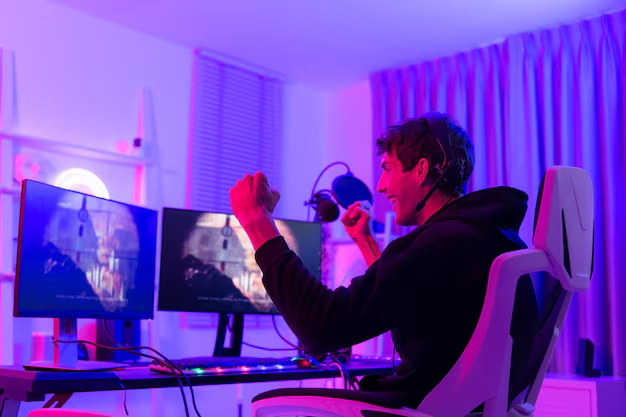The Impact of Gaming Culture on Society and Technology
Gaming culture has grown exponentially in recent years, becoming a significant part of entertainment, social interaction, and technological development. Its impact is felt across various aspects of society, from social behavior to technological advancements. Here’s a deeper look at the influence gaming culture has on both society and technology:
1. Social Connectivity and Community Building
- Online Communities: One of the most notable impacts of gaming is the creation of online communities. Games like World of Warcraft, Fortnite, and League of Legends have become platforms where players meet, form friendships, and socialize, often transcending geographical boundaries. These communities provide spaces for people with shared interests to connect, chat, and collaborate, sometimes in ways that mirror or enhance traditional social gatherings.
- Influence on Social Norms: The language, behavior, and values that emerge from gaming culture, including the increasing focus on teamwork, competition, and strategic thinking, are influencing broader social norms. This has made gaming a social activity that influences everyday communication and even professional interactions.
2. Economic Impact
- Gaming Industry Growth: Gaming has evolved into a multi-billion-dollar industry. The rise of mobile games, esports, and live streaming (on platforms like Twitch and YouTube) has generated new economic opportunities, creating jobs in game development, content creation, and digital marketing. The esports sector, for example, has grown into a global industry with professional tournaments, sponsorships, and merchandise sales.
- Monetization Models: Free-to-play games with in-app purchases, such as Fortnite and Apex Legends, have also reshaped how the gaming industry generates revenue. These models are influencing business strategies beyond gaming, including the development of microtransactions in other digital sectors, such as software and apps.
3. Impact on Technology
- Advancements in Graphics and Processing Power: Gaming culture has driven continuous innovation in technology. The demand for high-quality graphics, faster processors, and immersive experiences (such as virtual reality and augmented reality) has pushed tech companies to develop more powerful hardware, such as GPUs (Graphics Processing Units) and consoles. Graphics engines, like Unreal Engine and Unity, have become essential tools for both game developers and creators in other industries, such as film and architecture.
- Virtual Reality and Augmented Reality: VR and AR technologies, which originated in gaming, are making their way into other fields, including education, healthcare, and architecture. Games like Half-Life: Alyx and Beat Saber have popularized VR as a viable form of entertainment, and the technology is expanding its influence into professional and creative applications.
4. Cultural and Psychological Impact
- Representation in Games: There’s an increasing focus on diversity and inclusion within gaming. Historically, games have been critiqued for their lack of representation, but today, there is a growing push for more diverse characters, storylines, and creators. This has created a cultural shift toward more inclusive narratives, which is impacting not just games but other forms of media as well.
- Mental Health and Gaming: Gaming has become a therapeutic tool in some cases, with studies suggesting that it can offer cognitive and social benefits, such as stress relief, increased creativity, and improved problem-solving skills. However, concerns also exist regarding addiction, online harassment, and the impact of excessive screen time, leading to an ongoing conversation about the balance of gaming in everyday life.
5. Gaming and Education
- Gamification: The principles of gaming, such as points, levels, and rewards, are increasingly being applied in education, known as “gamification.” This method engages students more effectively, particularly in subjects like mathematics and history, by making learning more interactive and fun. Games like Minecraft are used in schools to teach everything from architecture to teamwork and problem-solving.
- Simulation and Training: Games are also being used in professional fields for simulation and training. Military, medical, and aviation sectors, for instance, have integrated simulations (inspired by video games) for training purposes, as they allow for realistic, risk-free practice in complex scenarios.
6. Cultural Influence and Entertainment
- Mainstreaming of Gaming: Video games have moved from a niche hobby to a mainstream form of entertainment on par with movies and television. The success of game-based movies (like The Witcher series and Sonic the Hedgehog) and the rise of game-streaming platforms further prove that gaming is not just a hobby but a cultural force that affects popular media. The massive success of games in pop culture (e.g., Super Mario, The Legend of Zelda, and Pokémon) has shaped both nostalgia and current entertainment.
- Content Creation and Streaming: Content creators and streamers on platforms like Twitch and YouTube have revolutionized how gaming content is consumed. What was once a solo experience has turned into a social event where millions watch live streams of gameplay, contributing to a new form of entertainment and online celebrity culture.
7. Social Impact and Controversies
- Violence and Aggression: One of the most contentious debates around gaming culture is the alleged link between violent video games and real-world violence. While research has shown no conclusive evidence that video games lead to aggression or violent behavior, the discussion continues to shape public opinion and policy around gaming.
- Gender and Diversity: Gaming culture, particularly the online space, has been criticized for its issues with sexism, racism, and harassment. However, the gaming community has also become a space for activism, with movements like #MeToo and #GamerGate raising awareness about these issues and pushing for a more inclusive and safe environment for everyone.
Conclusion
Gaming culture’s impact on society and technology is profound and multifaceted. From fostering global communities and driving technological innovation to influencing entertainment and education, gaming continues to shape modern life in complex ways. While challenges such as addiction, representation, and toxicity remain, the overall influence of gaming culture is a testament to its importance in shaping both the present and future of our digital world.

